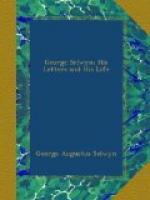(137) See note (109)
Selwyn, as we see by the preceding letter, represented the optimistic spirit of the English people in regard to the American War. His friend Storer, though one of the Court party and a place seeker, shows a much truer appreciation of the actual condition of affairs. With a keener interest than Selwyn in political matters he sometimes, as already mentioned, took his friend’s place as Lord Carlisle’s correspondent when political interest was aroused. In the letter which follows he perceives clearly the future course of the struggle.
Anthony Storer to Lord Carlisle.
(1775,) Dec. 29, Bath.—I broke off very abruptly in my last, telling you that Oliver’s Motion came into Parliament in so strange a form, that it met with very little encouragement; Wilkes counted twelve who divided with him on the main Question, and he dignified them by calling them his twelve Apostles.
Sawbridge had attacked the present Administration for their intended folly of taking up four other persons besides Mr. Eyre upon the news of that plot, that made so much noise for a day or two at the opening of Parliament; and said that some person in Administration had very wisely objected to it, because instead of having the Wilkes, there would immediately be five.
To which Lord North answered by saying, though he might believe a Buckingham House Junto might do a great deal, yet he had so much respect for Mr. Wilkes, as not to imagine that they could easily make another person at (all?) similar to him; that he had seen the difficulty of such an undertaking by observing, that gentlemen who made it the whole object and study of their lives to resemble him, had failed in the attempt. He ended by quoting—Non cuivis homini contingit, etc.; some of the Treasury prompted him—Ex quovis ligno non fit Mercurius.
We divided twice that day, besides having a third Question. The order of the day was first put, then the previous Question, and the main one. So that Wilkes and his party divided with us upon the previous Question. Lord North upon this desired, while the minority was in the Lobby, that gentlemen would stay for the main Question, as we should not have some of the present majority with us. Upon the whole, I never saw a Question in Parliament treated with so little respect.
Now I ought, according to the course of proceedings, give you some account of Hartley’s; but as he has printed his speech, I will not take that out of his hands, which he has so much more right to. He spoke for above two hours. Good God! I shudder even now at the thoughts of it. No one can have a complete idea of a boar (sic) who has not been in Parliament.
Thus you have seen an epitome of what we have been about; what we are to do, you are more likely to know than I, having a direct avenue to the Cabinet; but I believe it is scarcely in their power to say what we are to do. Whether we are to send Russians, or French, or what nation the troops are to be of, I cannot guess. They say Russians cannot go on account of the ice in the Baltic; and then if they could, they say the French and Spaniards would not let them. We are playing tres gros jeu, and in every way a losing game.




